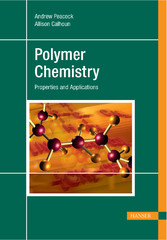Andrew J. Peacock, Allison Calhoun
Polymer Chemistry
Properties and Application
Preface
8
Acknowledgements
9
Contents
10
1 Introduction to Synthetic Polymers
22
1.1 Definition of Polymers
22
1.2 Chemical Categories of Polymers
24
1.3 Physical Categories of Polymers
31
1.4 Statistical Distributions
34
1.5 Properties and Applications
38
Review Questions for Chapter 1
40
2 Polymer Chemistry
42
2.1 Introduction
42
2.2 Thermoplastics and Thermosets
42
2.3 Chain Growth Polymerization of Thermoplastics
43
2.4 Step Growth Thermoplastic Polymers
53
2.5 Comparison of Chain Growth and Step GrowthPolymers
56
2.6 Commercial Methods of Thermoplastic Polymerization
57
2.7 Polymerization of Thermosets
62
2.8 Conclusions
64
Review Questions for Chapter 2
64
3 Thermodynamics, StatisticalThermodynamics, and Heat Transfer
66
3.1 Introduction
66
3.2 Energy of Polymerization Reactions
74
3.3 Energies of Interactions
75
3.4 Statistical Thermodynamics
80
3.5 Heat Transfer
81
3.6 Summary
81
Review Questions for Chapter 3
82
4 Kinetics
84
4.1 Introduction
84
4.2 The Rate Law: Orders, Rate Constants, and Their Use
85
4.3 Kinetics of Step Growth Polymerization Processes
90
4.4 Kinetics of Chain Growth Polymerization
91
4.5 Other Kinetic Processes Studied in Polymeric Systems
95
4.6 Conclusions
95
Review Questions for Chapter 4
95
5 Molecular Characterization of Polymers
98
5.1 Introduction
98
5.2 Molecular Weight
99
5.3 Homopolymer Chemical Composition
107
5.4 Copolymer Chemical Composition
110
5.5 Branching
114
5.6 Crosslinking
119
5.7 Conclusions
123
Review Questions for Chapter 5
123
6 Rheological Properties of PolymericMaterials
124
6.1 Introduction
124
6.2 Flow, Stresses, Strains and Deformations
124
6.3 The Molecular Origin of Rheological Properties
128
6.4 Temperature Effects on Rheological Properties
131
6.5 Measurement Techniques
132
6.6 Implications of Rheology and Conclusions
133
Review Questions for Chapter 6
134
7 Development and Characterizationof Solid State Molecular andSupermolecular Structure
136
7.1 Introduction
136
7.2 Solid State Morphology
137
7.3 Crystallization
143
7.4 Characterization of Solid State Molecular andSupermolecular Structure
147
7.5 Conclusions
155
Review Questions for Chapter 7
156
8 Solid State Properties of Polymers
158
8.1 Introduction
158
8.2 Mechanical Properties
158
8.3 Optical Properties
173
8.4 Surface Contact Properties
177
8.5 Barrier Properties
181
8.6 Electrical Properties
184
8.7 Weather Resistance
189
8.8 Conclusions
190
Review Questions for Chapter 8
190
9 Polymer Degradation and Stability
192
9.1 Polymer Lifetime Experiences
192
9.2 General Descriptions of Degradation
192
9.3 Conclusions
201
Review Questions for Chapter 9
202
10 Polymeric Mixtures
204
10.1 Introduction to Polymeric Blends and Mixtures
204
10.2 Polymer Blends
204
10.3 Properties of Blends
209
10.4 Polymer-Additive Mixtures
212
10.5 Conclusion
214
Review Questions for Chapter 10
214
11 Extrusion Processes
216
11.1 Introduction
216
11.2 Principles of Extrusion
216
11.3 Profi le Extrusion
220
11.4 Film and Sheet Casting
221
11.5 Film Blowing
223
11.6 Fiber Spinning
225
11.7 Extrusion Coating
227
11.8 Wire and Cable Coating
228
11.9 Conclusion
229
Review Questions for Chapter 11
230
12 Compounding
232
12.1 Introduction
232
12.2 The Goal of Compounding
232
12.3 Compounding Equipment
234
12.4 Additional Considerations
242
12.5 Conclusions
243
Review Questions for Chapter 12
243
13 Injection Molding
246
13.1 Introduction
246
13.2 Principles of Injection Molding
246
13.3 Products
251
13.4 Conclusion
252
Review Questions for Chapter 13
252
14 Blow Molding
254
14.1 Introduction
254
14.2 Principles of Blow Molding
254
14.3 Products
260
14.4 Conclusion
261
Review Questions for Chapter 14
261
15 Rotational Molding
264
15.1 Introduction
264
15.2 The Process
264
15.3 Materials Used for Rotational Molding
269
15.4 Rotational Molding Equipment
270
15.5 Rotational Molded Products
271
15.6 Conclusions
271
Review Questions for Chapter 15
272
16 Thermoforming
274
16.1 Introduction
274
16.2 Principles of Thermoforming
274
16.3 Products
277
16.4 Conclusion
278
Review Questions for Chapter 16
279
17 Recycling
280
17.1 Introduction
280
17.2 Materials Amenable to Recycling Processes
280
17.3 Recycling Commercial Scrap
281
17.4 Post Consumer Recycling
282
17.5 Tertiary and Quaternary Recycling
285
17.6 Conclusions
286
Review Questions for Chapter 17
286
18 Polyethylene
288
18.1 Introduction
288
18.2 Chemical Structure
288
18.3 Manufacture
291
18.4 Morphology
298
18.5 Structure/Property Relationships
299
18.6 Products
302
18.7 Conclusions
303
Review Questions for Chapter 18
304
19 Polypropylene
306
19.1 Introduction
306
19.2 Chemical Structure
306
19.3 Structure and Morphology: Isotactic Polypropylene
307
19.4 Manufacture
310
19.5 Structure and Property Relationships
313
19.6 End Uses
315
19.7 Conclusions
317
Review Questions for Chapter 19
318
20 Polycarbonates
320
20.1 Introduction
320
20.2 Polymer Chemistry
320
20.3 Structure and Morphology
323
20.4 Manufacture
323
20.5 Structure and Property Relationships
325
20.6 Manufacturing Methods Using Polycarbonate
326
20.7 Conclusions
327
Review Questions for Chapter 20
327
21 Polystyrene
330
21.1 Introduction
330
21.2 Chemical Structure
331
21.3 Synthesis
333
21.4 Foam Manufacture
339
21.5 Structure/Property Relationships
341
21.6 Products
342
21.7 Conclusions
343
Review Questions for Chapter 21
344
22 Polyvinyl Chloride
346
22.1 Introduction
346
22.2 Chemical Structure
346
22.3 Manufacture
347
22.4 Morphology
349
22.5 Degradation of Polyvinyl Chloride
350
22.6 Additives to Polyvinyl Chloride
352
22.7 Processing Methods and Applications
354
22.8 Conclusions
358
Review Questions for Chapter 22
359
23 Nylons
360
23.1 Introduction
360
23.2 Chemical Structure
361
23.3 Manufacture
363
23.4 Morphology
366
23.5 Structure/Property Relationships
369
23.6 Products
371
23.7 Conclusions
372
Review Questions for Chapter 23
373
24 Polyesters
374
24.1 Introduction
374
24.2 Chemistry of Polyesters
374
24.3 Structure and Morphology
379
24.4 Structure/Property Relationships
380
24.5 End Uses
382
24.6 Conclusions
384
Review Questions for Chapter 24
384
25 Polyurethanes
386
25.1 Introduction
386
25.2 Chemical Structure
387
25.3 Manufacture
389
25.4 Morphology
395
25.5 Structure/Property Relationships and End Uses
397
25.6 Conclusions
401
Review Questions for Chapter 25
402
Additional Reading
404
Subject Index
408
The Authors
420
© 2009-2024 ciando GmbH
 Zu Hanser-Fachbuch.de
Zu Hanser-Fachbuch.de
 Warenkorb
Warenkorb
